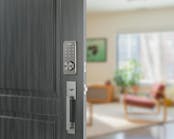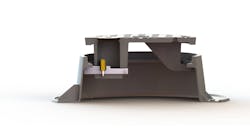Locksmith Ledger’s recent webcast, The Art of Master Keying, featured a roundtable with some of the brightest minds in this area. These subject matter experts looked at the current state of master keying, including current approaches and best practices for master keying, as well as trends, challenges, and opportunities in this highly skilled area of locksmithing.
Our speakers included:
· Locksmith and Author Ralph Forrest-Ball, who received the D'Adamo ACE Award in 2022 and is the author of the book Mastering the Basics of Master Keying
· Tyler J. Thomas, president of Security Engineering Consultants in Atlanta, Ga., also the executive producer of The Three Tumblers podcast and the 2022 recipient of ALOA’s President’s Award
· Dale Bowman, director of Business Development, OEM, and International Sales, Medeco Security Locks, who in addition to his more than 25 years of experience in the security industry, is director of ALOA-AIL and served as secretary of the Institutional Locksmith Association
State of the Industry
Master keying has evolved over the years to the point where Forrest-Ball says there are differences between the way things are and the way things should be.
“When I think about expectations and reality, I see a lot of master key systems out there that well, maybe they don't even deserve the name of systems,” he says. “They're just thrown together randomly. I've been called in many times with someone saying we need some work on our system, and I ask if I can look at the paperwork and they say, ‘What paperwork?’ That's always a bad sign. But when I do take over, even the best system that was carefully planned the way that it should be with good hardware, even the best system is going to have mistakes in it. There's going to be a plan of how they meant to set it up, and then there's what happened over time as some of the locks got replaced, or somebody else changed some locks without permission, or changes were made, and they didn't keep careful records of what the changes were.”
Forrest-Ball points out that the mistakes tend to multiply as the system gets older, but the biggest problem that he runs into is that people have an unrealistic expectation of what a master key system can do.
“They think a master key system is a magical thing that will automatically keep out everyone who's not allowed in and automatically admit only the people who do have authorization, but they need to understand that putting master pins into a lock decreases the security of the lock, and that's why we're supposed to use as few master pins as possible, and the system should be carefully planned out, not random.”
Bowman agrees that end users tend to have unrealistic expectations. “A lot of times they just don't know what the capabilities are and what a system can actually do for them, and they rely on us as those security professionals, the experts, to help guide them through that process on designing a system that not only meets their needs but fulfills growth into the future as well, but is also secure.”
He continues, “Everyone wants that power of the master key … You just have to set those expectations that that is a very risky, a very dangerous key to have. In fact, we have some customers, for example, they kind of reset that expectation on what that top key is, or what that grand master key is and don’t even call it a grand master or a top master key – they actually classify it as an emergency override key … only to be used and in special circumstances or events.”
Bowman points out that customers even go as far as assigning a dollar value if the key is lost and a complete rekey of the facility is needed, which could cost anywhere from thousands to tens of thousands depending on the number of doors that need rekeying.
“Another missed opportunity that we have in those beginning stages of talking about key system design or a new master key system with customers is setting that expectation on the length of time that that system should be in place,” he explains. “You know a master key system is not forever, and I'm fortunate enough to travel around and meet with a lot of customers, a lot of end users who have master key systems that haven't been touched or managed very well for 10-, 15- or 20 years … so setting that expectation that there is a life to this – a key system is dynamic, it's constantly changing and it has to be managed and obviously you're going to get more or less life out of that depending on what you do to maintain that system over time.”
Thomas agrees that there often isn’t a good record of the work that has been done, or of the person who oversaw the work.
“The big reality on the end user side that we're seeing is there's a tremendous amount of turnover with property management and engineering staff, whether it's in a high-rise or a two-story building,” he points out. “So, it's always a kind of educating staff along the way, relaying proper terminology, best practices, stuff like that. The good news, though, is that when those employees ultimately go elsewhere, and they pretty much always do, they take that knowledge with them and that usually means getting you involved. They’re like ambassadors for your company, so if you support and train them properly, they're going to go to bat for you and help you with more business.”
Impact of Electronic Access Control
In the world of locksmithing, the rise of electronic access is changing the way end users look at keys, key management, and keyless access.
“We're seeing a big impact and a lot of adoption and a very attractive and growing market for us and our channel partners for the need of that digital master key,” says Bowman. “You know kind of the blending – the best of both worlds – where you're getting strong physical security and mechanical attributes, but you're also getting the benefits of those access control elements as well. So, we're seeing that trend continue, and the adoption continue, and the growth continue, and that is an opportunity for everyone when it comes to thinking or looking at master key systems differently moving into the future.”
Forrest-Ball agrees, noting that electronic access control provides a lot more flexibility.
“I bring that up all the time in the classes that I teach about master keying, and I say that when we talk about cross keying, when a customer asks you for a cross key lock, that almost always means that what they really want is electronic access control,” he explains. “They just don't realize that that's what they wanted. They say, ‘I want this person to get into that room, but not that person.’ What they really mean when they say that is that they want the ability to instantly take someone out of that list of who is who is not authorized to go into that area.”
He continues, “And sometimes that's just flat impossible with mechanical pin tumbler locks. So that's the place where we need to educate the customer more, especially when they start asking about cross keying. But someone else mentioned the override key, and that's a good point to bring up as well that if they do have electronic access control and they're worried about what happens when the power goes out, what happens when the battery is dead … that override key needs to be in the hands of as few people as possible, because if you hand them out to all the managers, and then they start thinking, ‘Oh, I don't need to use my electronic credential, I can just use the override key,’ but what if they lose that key? The audit trail is one of the biggest reasons for having electronic access control but you're going to give that up if everybody has an override key.”
Lessons in Liability
During the Q&A portion of the webcast, the panel delves into the topic of liability, which as Forrest-Ball points out can be a challenging one.
“That is a tricky question, and it is something that I would often suggest bringing up with the customer,” he says. “Especially if you tell them the way that the system should be designed and they say, ‘Can't you just cut some corners and take some shortcuts?’ If you explain to them, look if somebody's laptop gets stolen, that's going to cost you a few thousand to replace it and if there was information on the laptop that got stolen, now we're talking $10,000, $20,000, $50,000. But if there was a human being sleeping behind the door, and somebody got a hold of the master key who shouldn't have had it, and that person ends up injured or killed, now we're talking tens of millions of dollars for a lawsuit. That will get their attention.”
Sometimes the customer will ask if they can just sign a waiver. “All that does is put in writing the fact that you knew it was wrong and you did it anyway,” says Forrest-Ball. “That makes it worse, not better.”
While a waiver is not a good idea, Thomas agrees that a lot of liability issues and bad situations can be prevented through proper documentation. “For example, when you're done designing and laying out a system, you must present the schematic and have them sign off, so down the road, there are no questions about it. Similarly, you know cross keying, having multiple key sets work in one opening – that's not against the rules – but you'd like to relay to the customer, probably through an e-mail, that if they ultimately decide to go with it, that's on them, and you at least have a record of it so if the next property manager or chief engineer comes by and says, ‘Why did we do it that way?’ you can show them that somebody from your facility said they wanted it that way.”
Note: This is part of Locksmith Ledger’s new webcast series, with the next one planned for June 11, at 1 p.m. ET, focusing on school security. Registration information will be posted at www.locksmithledger.com/webinars.
Paul Ragusa | Senior Editor
Paul Ragusa is senior editor for Locksmith Ledger. He has worked as an editor in the security industry for nearly 10 years. He can be reached at [email protected].






